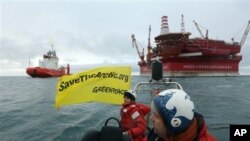MOSCOW —
Russian authorities have detained a Greenpeace ship and threatened to bring criminal charges after activists scaled Russia's first Arctic offshore oil platform.
Greenpeace said armed coastguards had forcibly boarded and seized the Arctic Sunrise on Thursday, a day after two activists were plucked from the side of the Prirazlomnaya rig, owned by the state-controlled energy giant Gazprom, and arrested.
The Federal Security Service (FSB) said the Amsterdam-registered ship was being towed to Murmansk but might not arrive until Monday. It said there were 27 people on board, including four Russian citizens.
The regional unit of Russia's Investigative Committee said it was considering bringing charges of piracy, which can carry a sentence of up to 15 years in jail.
The FSB denied the environmental campaign group's assertion that the ship had been in international waters when it was seized.
Greenpeace, which aimed to draw attention to the threat to the fragile Arctic ecosystem from expanding oil drilling, said it had had no contact with the crew in many hours, and that law enforcement officers had damaged the ship's communications equipment.
The Russian Foreign Ministry said on Thursday that the Greenpeace protest "was aggressive and provocative and bore outward signs of extremist activity that could lead to people's deaths and other grave consequences."
It said it had summoned the Dutch ambassador to complain.
Greenpeace said the real threat to the region was not its campaign ship but reckless energy exploitation.
"The safety of our activists remains our top priority and we are working hard to establish what is facing them," Ben Ayliffe, the group's Arctic oil campaign head, said in a statement.
"They have done nothing to warrant this level of aggression and have been entirely peaceful throughout."
Gazprom declined to comment.
Russia has made tapping the region's hard-to-reach resources a priority, and production from the Prirazlomnoye deposit is expected to start later this year, after delays that Gazprom blamed on technical issues.
It is expected to reach peak production of 6 million tons per year (120,000 barrels per day) in 2019.
Greenpeace said armed coastguards had forcibly boarded and seized the Arctic Sunrise on Thursday, a day after two activists were plucked from the side of the Prirazlomnaya rig, owned by the state-controlled energy giant Gazprom, and arrested.
The Federal Security Service (FSB) said the Amsterdam-registered ship was being towed to Murmansk but might not arrive until Monday. It said there were 27 people on board, including four Russian citizens.
The regional unit of Russia's Investigative Committee said it was considering bringing charges of piracy, which can carry a sentence of up to 15 years in jail.
The FSB denied the environmental campaign group's assertion that the ship had been in international waters when it was seized.
Greenpeace, which aimed to draw attention to the threat to the fragile Arctic ecosystem from expanding oil drilling, said it had had no contact with the crew in many hours, and that law enforcement officers had damaged the ship's communications equipment.
The Russian Foreign Ministry said on Thursday that the Greenpeace protest "was aggressive and provocative and bore outward signs of extremist activity that could lead to people's deaths and other grave consequences."
It said it had summoned the Dutch ambassador to complain.
Greenpeace said the real threat to the region was not its campaign ship but reckless energy exploitation.
"The safety of our activists remains our top priority and we are working hard to establish what is facing them," Ben Ayliffe, the group's Arctic oil campaign head, said in a statement.
"They have done nothing to warrant this level of aggression and have been entirely peaceful throughout."
Gazprom declined to comment.
Russia has made tapping the region's hard-to-reach resources a priority, and production from the Prirazlomnoye deposit is expected to start later this year, after delays that Gazprom blamed on technical issues.
It is expected to reach peak production of 6 million tons per year (120,000 barrels per day) in 2019.




